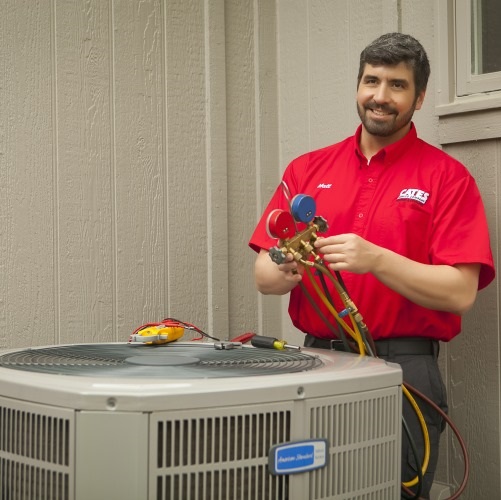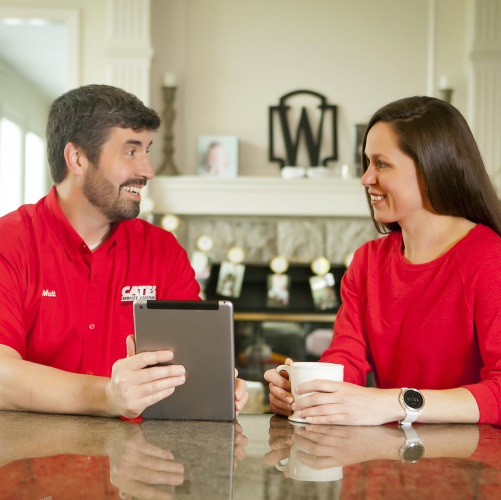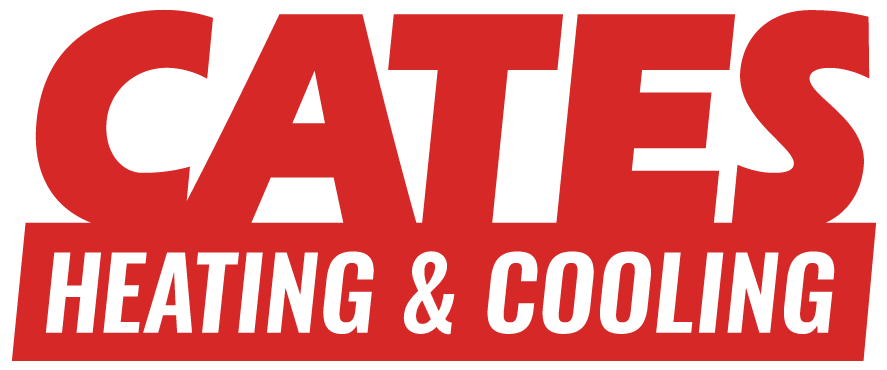Expert Technicians Servicing Any Brand
Same Day Service: Call 913-888-4470 or Request an Appointment Online
Stay Comfortable Year-Round
Check out Cates's new financing options for residential repairs and new equipment today!
Water Heaters
Can you imagine taking cold showers every day? Do you wash your dishes with cold water? Hot water heaters are responsible for providing your home with the hot water that you use daily without much thought. There are different types of water heaters that work in different ways, and it can be a challenge for homeowners to determine the right water heater for their home. The experts at Cates Heating and Cooling can provide you with the information you need to pick out the best water heater for your household.
Types of Water Heaters and How They Work
There are three main types of water heaters: storage tank, tankless, and heat pump.
Storage Tank Water Heaters
Conventional storage tank water heaters use a large insulated tank to store hot water. This water is used throughout the home. The storage tanks can range from 30 to 80 gallons and are powered by either natural gas or electricity.
Tank heaters collect water in a large insulated storage tank. Cold water enters the bottom of the tank. In the tank, it is heated to the temperature indicated on the adjustable thermostat. There is a pressure-relief valve to help prevent the buildup of pressure in the tank.
When you turn a faucet to hot water or start your washer or dishwasher, heated water from the top of the tank is pumped out of the tank and through the water pipes in your home. As the water level in the tank drops, cold water is brought in through the bottom of the tank, and the process begins again.
Tankless Water Heaters
Unlike conventional storage tank water heaters, tankless systems don’t store hot water. Instead, water is heated on demand. This prevents the system from constantly running like a conventional water heater. These systems tend to last up to 20 years.
Tankless heaters provide hot water for the home without using a storage tank. These water heaters do nothing until you turn your tap to hot water or indicate hot water via an appliance. At this point, cold water is drawn into the water heater unit, and a flow sensor starts an electric heating element or gas-fired burner, which warms an internal heat exchanger.
Cold water passes over the heat exchanger where it is heated to the preset temperature. Hot water then moves through your home to the place where it was needed. In homes with gas-fired units, combustion gases are exhausted through a sealed vent pipe. Once the tap is turned off, the hot water heater stops running, making this a more energy-efficient option.
Heat Pump Water Heaters
Heat pump water heaters use the heat from the air or ground and transfer that heat into the water before circulating it into your home. These water heaters use electricity to power the unit. Heat pump units are often more expensive than conventional electric water heaters at first, but they use about 60 percent less energy.
Other Types of Water Heaters
In addition to these three main types of water heaters, there are also a couple of other types of water heaters that you might find useful.
Point-of-use Water Heaters
Point-of-use water heaters are a completely different kind of water heater. Instead of heating water for your entire home, they only deliver hot water to one specific location. This location may be a sink, shower, or appliance. These fixtures are generally installed at fixtures that are far away from the whole home water heater. Point-of-use water heaters prevent homeowners from having to wait a long time to get hot water from the faucet.
Point-of-use water heaters tend to be small, and they can be easily hidden in cabinets and closets. They have lifespans of up to 25 years, and they are considered extremely reliable. You do need an outlet nearby, but installation is also very easy.
Solar Water Heaters
Using the sun as energy, solar water heaters are considered an energy-efficient option. There are two types of solar water heaters: active and passive. Active solar water heaters have pumps that circulate the heated water through your home. Passive solar water heaters use the flow of gravity to bring hot water to various places in your home.
Selecting a New Water Heater
Choosing a new water heater can be a challenge for homeowners. There are a lot of factors to consider. Let’s take a look!
Fuel Type
Start by choosing the fuel type. In some cases, you might not have much choice, but here are your options:
- Electric: less expensive, replaceable heating elements
- Natural gas: more expense, more energy-efficient
- Propane: heats twice as fast as electric, takes up less space
Tank vs. Tankless
The next big decision is what type of water heater is going to work best for your household.
Storage tank water heaters provide hot water fast, and you can choose a size that ensures that your family always has enough hot water. Choosing the right size of storage tank starts by looking at the number of people who will be using the hot water in your home on a regular basis. Here’s a handy chart to help you:
- 1-2 people: 23- to 36-gallon tank
- 2-4 people: 36- to 46-gallon tank
- 3-5 people: 46- to 56-gallon tank
- 6+ people: 56+-gallon tank
Tankless water heaters can be a bit more complicated. When you decide to get a tankless water heater, you will need to calculate your flow rate, which is the gallons per minute (GPM) of hot water that each fixture and appliance in your home needs. You will then need to add all of these together to get your home’s total flow rate. You want to ensure that you end up with a unit that can meet your needs, so if you are prone to showering with both the washing machine and dishwasher running, you want to make sure you are accounting for that.
Here are some typical flow rates:
- Bathroom faucet: 0.5-1.5 GPM
- Shower: 1.0-2.0 GPM
- Dishwasher: 1.0-2.5 GPM
- Washing machine: 1.5-3.0 GPM
- Kitchen faucet: 3.0-7.0 GPM
After you have determined your household’s flow rate, you can start to figure out the required temperature rise of your home. The temperature rise is the difference between your groundwater temperature and the temperature you want your hot water to be, which is usually around 120°F. In the Kansas City area, the shallow groundwater temperature is between 52°F and 57°F. So, let’s just say the groundwater temperature is 55°F. Take 120°F and subtract 55°F. This gets you 65°F, which is your temperature rise figure.
Use both your flow rate and temperature rise number to determine what you need in a new tankless water heater.
Space
Finding a hot water heater that will fit in the designated space is also important. While this isn’t usually an issue with tankless hot water heaters, there are options for tanked systems. Lowboys or short water heaters are usually shorter and wider than a traditional tanked system. These are great for homes where the water heater is located in an area without a lot of headroom, such as crawlspaces and under cabinets. There are also tall units that can hold large quantities of water in areas where height isn’t an issue, such as aa basement or garage.
Energy Efficiency
An energy efficient water heater will save you money on your utility bills each month. Check any potential water heater’s Energy Factor (EF) rating. The EF rating tells you how efficiently the water heater will convert energy into heat. It also tells you how much heat is lost during storage. The higher the ER rating, the more efficient the water heater.
Bonus Features
While bonus features are just that—a bonus—you might want to think about these extras when you are purchasing a water heater.
- Dry-Fire Protection: Technology that prevents the upper element from burning out if the unit senses that there is no water around it. Used only on electric water heaters.
- Intuitive Technology: With this technology, your water heater will learn your needs and patterns of use for adjusting the temperature and other operating features. This can make the unit more efficient and help it last longer.
- Wi-Fi: A water heater that connects to Wi-Fi can be controlled remotely. You can create a schedule so that hot water is only available when you need it, which can save you money on your energy bill. These systems can also send you an alert when you are running low on hot water.
- Premium Electronic Gas Valve: Some gas water heaters now have an electronic gas valve, which yields more reliable and accurate performance when it comes to temperature control and hot water recovery speed. This is due to the fact that these valves have fewer moving parts than conventional mechanical gas valves.

See What Our Customers Have To Say!
Want to know what people have to say about Cates Heating and Cooling? Read customer testimonials, and don’t forget to tell us about your experience with Cates by leaving a review.

Finance
Don’t stress out about paying for HVAC repair and replacement services when you go with Cates Heating and Cooling. We offer a few financing options that will help you pay for your services.

Book Service
It can be hard to fit HVAC repairs into your busy schedule. Find a time that is convenient for you using our handy online calendar to book an appointment.

Worry-Free Guarantee
If 2 years from the date of installation you are not satisfied, Cates will try to quickly resolve your problem. If the solution is not to your satisfaction Cates, will remove and refund the cost of your equipment.





